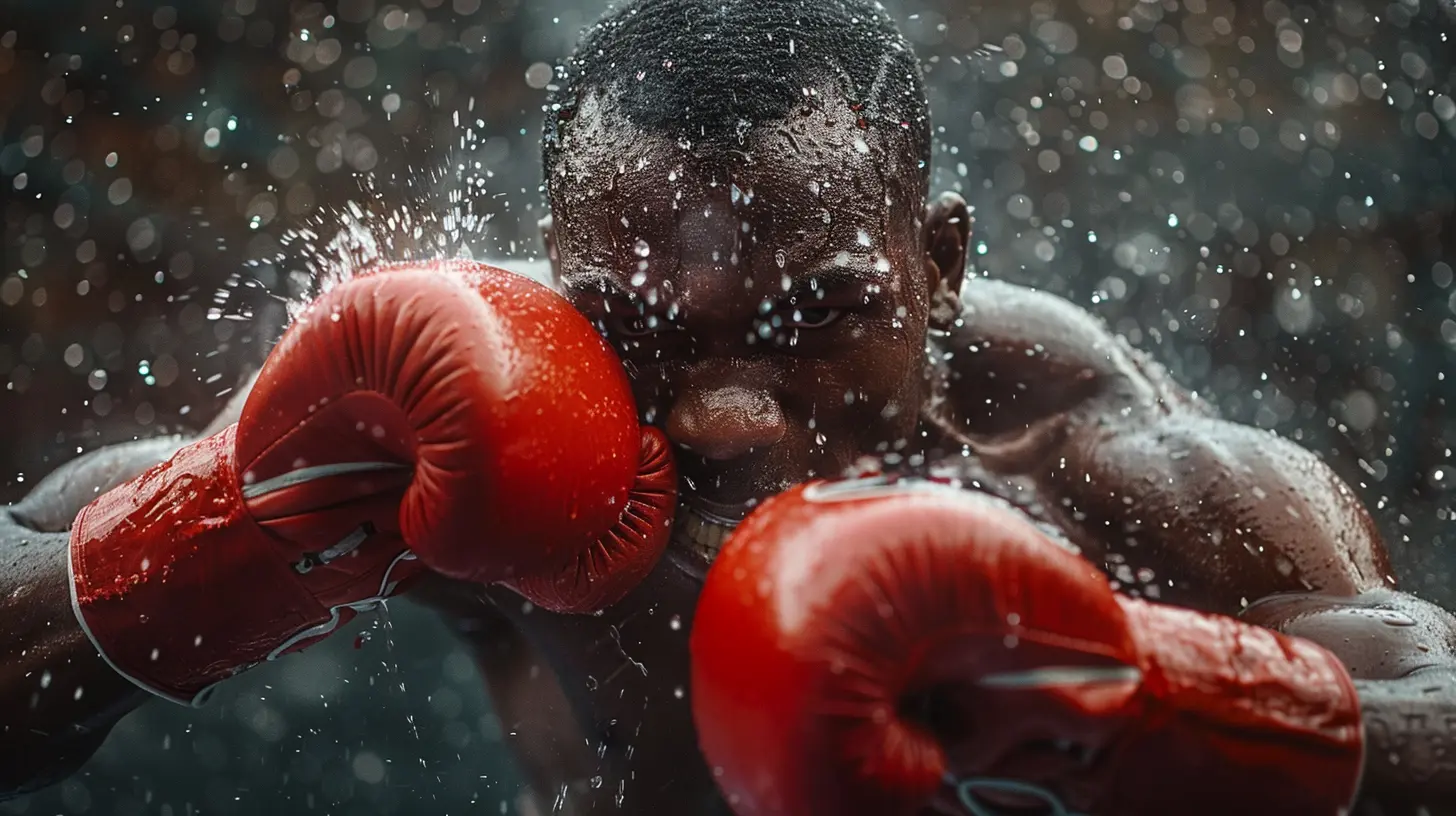The Science of Speed: How to Punch Faster in Boxing
8 May 2025
Introduction
Speed kills in boxing. Whether you're a seasoned pro or a beginner looking to sharpen your game, the ability to throw lightning-fast punches can be the difference between landing a knockout blow and leaving yourself open to counters. But contrary to popular belief, punching speed isn’t just about “being fast.” It’s a combination of technique, muscle activation, coordination, and even mental processing.
So, how do you develop blinding speed in your punches? Let’s break down the science behind it and the best ways to improve your fast-twitch explosiveness in the ring. 
The Science Behind Punching Speed
Before we jump into drills and exercises, it’s crucial to understand what makes a punch fast. It’s not just about swinging your arm quicker—it’s a full-body movement that involves multiple muscle groups and neurological coordination.Fast-Twitch vs. Slow-Twitch Muscles
Your muscles are made up of two main types of fibers:1. Slow-twitch fibers (Type I) – These are built for endurance. They don’t generate much explosive power but allow you to maintain activity for longer periods.
2. Fast-twitch fibers (Type II) – These are what you need for speed. They contract quickly and generate bursts of force, but they fatigue faster than slow-twitch fibers.
To increase your punching speed, you need to focus on developing your fast-twitch muscle fibers. Exercises that promote explosive power—such as plyometrics and speed drills—are key. 
Key Factors in Punching Speed
1. Relaxation and Fluidity
Tension slows you down. If you’re stiff and rigid when throwing a punch, your body has to fight against itself, which delays your speed. The best boxers in the world—like Muhammad Ali, Roy Jones Jr., and Sugar Ray Leonard—had an effortless flow to their movement.How to Fix It:
- Stay loose until the moment of impact.
- Breathe out sharply with each punch to maintain rhythm.
- Shadowbox with speed in mind, staying light on your feet.
2. Proper Technique
Speed isn’t just about hand movement—it’s the synchronization of your entire body. A punch originates from the legs, travels through the hips, engages the core, and finally extends through the arm.How to Fix It:
- Keep your elbows tucked in to reduce wasted movement.
- Rotate your hips and shoulders with each punch.
- Work on perfecting your form before adding speed.
3. Hand Speed vs. Reaction Speed
Punching fast is one thing, but reacting fast is another. Your brain plays a massive role in how quickly you can throw punches. The faster you can process information, the quicker you can launch an attack.How to Improve It:
- Use reaction-based drills (e.g., catching a tennis ball mid-air).
- Work on hand-eye coordination with speed bag drills.
- Train with unpredictable movement patterns to sharpen reflexes. 
Best Drills to Increase Punching Speed
Now that we’ve covered the science, let’s get into practical drills that’ll help you punch faster.1. Shadowboxing with Hand Weights
Holding light weights (1–2 lbs) while shadowboxing can build arm endurance. The key here is to maintain speed and form rather than focusing on resistance.How to Do It:
- Perform 3-minute rounds, focusing on fast, sharp punches.
- Keep the movements smooth—don’t overstrain.
- Drop the weights and throw rapid punches to feel the difference.
2. Resistance Band Punching
Resistance bands add controlled tension to your punches, forcing your muscles to adapt to increased workload while maintaining speed.How to Do It:
- Secure a resistance band around a pole and loop it around your back.
- Perform fast burst punches against the resistance.
- Complete multiple sets of 20-second high-speed punching bursts.
3. Speed Bag Training
The speed bag isn’t just for show—it conditions your arms, improves rhythm, and sharpens hand-eye coordination.Pro Tips:
- Keep your hands moving in a circular motion.
- Establish a rhythm before increasing speed.
- Incorporate head movement to simulate real fight scenarios.
4. Plyometric Push-Ups
Explosive push-ups develop the same fast-twitch fibers used in punching.How to Do It:
- Get into a push-up position.
- Push off the ground explosively, clapping your hands before landing.
- Do 3 sets of 10 reps, focusing on maximum force with each push.
5. Double-End Bag Drills
The double-end bag mimics the unpredictability of an opponent and forces quick reactions.How to Use It:
- Throw rapid combinations, adjusting to the bag’s movement.
- Focus on getting your punches back to guard position ASAP.
- Work on timing, accuracy, and head movement simultaneously. 
Strength and Conditioning for Faster Punches
1. Heavy Bag Speed Rounds
While power training on the heavy bag is important, speed-focused rounds develop explosive technique.How to Train:
- Perform 30-second bursts of non-stop fast punches.
- Keep your hands moving, no loading up on power.
- Gradually increase your speed each round.
2. Medicine Ball Throws
Medicine ball workouts enhance upper-body explosiveness.Best Drills:
- Wall Slams – Throw a medicine ball against the wall with maximum force.
- Overhead Slams – Lift the ball high and slam it down explosively.
- Chest Passes – Throw the ball forward as fast as possible.
3. Jump Rope Training
Jumping rope isn’t just for conditioning—it enhances foot speed and hand coordination.Pro Tips:
- Perform double-unders to increase speed.
- Keep your wrists relaxed for better rope control.
- Aim for 3 rounds of 3 minutes at high intensity.
Mental Training for Faster Punches
Speed isn’t only physical—it’s also mental. Your brain has to process and execute movement faster than your opponent.1. Visualization Techniques
Picture yourself throwing fast, crisp punches. Mental imagery has been proven to increase neural efficiency, making movements more instinctive.2. Reaction Training
Use tools like the Blink Reflex Ball or spar with unpredictable partners to sharpen decision-making speed.3. Breathing Control
Fast breathing leads to tension, which slows you down. Practice breathing techniques to stay relaxed under pressure.Common Mistakes Slowing You Down
Even with all this training, you could be making critical mistakes that limit your punching speed. Avoid these:❌ Overloading with Heavy Weights
Lifting heavy builds strength, but too much bulk can slow you down. Aim for explosive, functional strength instead.❌ Too Much Muscle Tension
Holding unnecessary tension in your shoulders and arms limits speed. Stay loose!❌ Poor Recovery
Overtraining can cause fatigue, slowing both reaction time and hand speed. Prioritize rest and recovery.Conclusion
Speed is a combination of technique, muscle explosiveness, reaction time, and mental sharpness. Increasing your punching speed isn’t just about throwing your hands faster—it’s about training your entire body to move efficiently and react instantly.By incorporating these drills, exercises, and mental strategies into your routine, you’ll notice a significant improvement in your hand speed. So, next time you step into the ring, you won’t just be fast—you’ll be too fast for your opponent to handle.
all images in this post were generated using AI tools
Category:
BoxingAuthor:

Umberto Flores
Discussion
rate this article
4 comments
Marley Riggs
Great insights on technique and training! Speed is essential in boxing; science makes it possible.
May 26, 2025 at 3:13 AM

Umberto Flores
Thank you! I'm glad you found the insights valuable. Speed is indeed a crucial element in boxing, and understanding the science behind it can make a big difference in performance.
Maggie McKibben
Speed isn’t just training; it’s physics in the ring!
May 17, 2025 at 8:23 PM

Umberto Flores
Absolutely! Speed is a combination of technique, strength, and the principles of physics that all come together in the ring.
Raine Hamilton
Sure, just add some rocket fuel to your fists and you'll be world champion in no time!
May 16, 2025 at 5:00 AM

Umberto Flores
While rocket fuel would be great for speed, training, technique, and conditioning are the real keys to mastering a faster punch!
Simone Dorsey
Great insights, truly motivating!
May 10, 2025 at 11:08 AM

Umberto Flores
Thank you! I'm glad you found it motivating!


